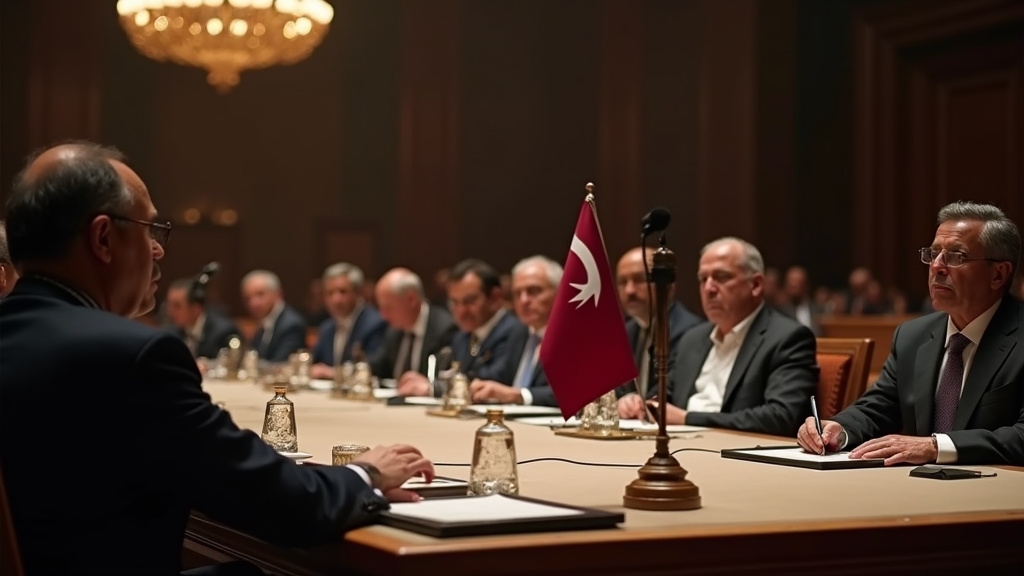Doha, Qatar – In a move signaling heightened regional tension, foreign dignitaries from across the Arab and Muslim world have convened in Doha for an emergency Arab-Islamic summit. The gathering, held on September 15, 2025, is a direct response to a recent Israeli strike on the Qatari capital that resulted in the deaths of five Hamas members and a Qatari security officer. Observers and participating nations anticipate the summit will move beyond condemnations, aiming to deliver a decisive and unified response with concrete measures against Israel, marking a significant development in the ongoing regional crisis.
The Catalyst: A Shocking Strike on Qatari Soil
The summit’s urgency stems from a brazen Israeli airstrike on Doha, which occurred just days prior to the meeting. The attack targeted individuals associated with Hamas while a negotiation team was present in the city, deliberating on a United States proposal for a ceasefire in Gaza. The strike, which killed five Hamas members and a Qatari security officer, missed the negotiation team but sent shockwaves across the region, drawing widespread condemnation and fueling demands for accountability. Qatari Prime Minister Sheikh Mohammed bin Abdulrahman bin Jassim Al Thani vehemently denounced the attack, labeling it an act of “state terrorism” and a “barbaric Israeli attack” that violated Qatar’s sovereignty. He emphasized the urgent need for the international community to abandon “double standards” and hold Israel accountable for its actions, underscoring that such aggression threatens regional peace and undermines de-escalation efforts.
Summit Convened: A Unified Front Against Aggression
The emergency summit brings together leaders and foreign ministers from both the Arab League and the Organisation of Islamic Cooperation (OIC). The preparatory ministerial meetings, held behind closed doors, worked to hammer out a draft resolution proposing concrete actions. The attendance of high-profile leaders, including Iran’s President Masoud Pezeshkian, Pakistan’s Prime Minister Shehbaz Sharif and Foreign Minister Ishaq Dar, and Turkish President Recep Tayyip Erdogan, highlights the gravity with which the Muslim world views the escalating Israeli actions. This gathering is already a top news item, capturing the world’s attention as it unfolds. The unifying message from Doha is clear: a show of solidarity with Qatar and a demand for a collective response to what is perceived as unchecked Israeli aggression.
Demands for Accountability: Concrete Measures on the Table
Participants are reportedly exploring a range of “concrete measures” designed to exert significant pressure on Israel. Discussions have moved beyond diplomatic statements, with proposals including the formation of a joint Arab-Islamic task force aimed at deterring further aggression. Sources indicate that measures such as pursuing the suspension of Israel’s membership in the United Nations and implementing coordinated punitive actions by member states are being seriously considered. Iranian President Pezeshkian has openly called for Muslim nations to sever ties with Israel, advocating for unity and cohesion. Pakistani Foreign Minister Ishaq Dar unveiled a comprehensive seven-point response, detailing proposals for a joint task force, challenging Israel’s UN membership, and implementing punitive measures, reflecting a trending sentiment for decisive action. Some analysts suggest that this summit could be a “gamechanger,” potentially leading to measures impacting trade, technology, and tourism, with the UAE already having banned Israel from a defense expo. The threat of such collective action has put Israel under a new spotlight.
Regional and International Implications
The strike on Doha has amplified fears of wider regional instability and is seen by many as a sign that Israel does not seek a ceasefire in Gaza. The summit’s outcomes are expected to have significant geopolitical implications, potentially straining diplomatic relations and altering regional dynamics. A draft resolution from the summit warned that Israel’s recent attack on Qatar threatens efforts to normalize ties, indicating a potential rollback of recent diplomatic advances. The OIC Secretary-General, Hissein Brahim Taha, denounced the strike and called for actions to end “state terrorism” and hold Israel accountable for its alleged crimes against Palestinians, supporting proposals for legal monitoring units to document violations. The focus on accountability and the potential for coordinated action are making this summit a highly anticipated and hyped event in international news cycles.
A New Chapter in Regional Diplomacy?
As the emergency Arab-Islamic Summit concludes its deliberations, the world watches to see if the proposed “concrete measures” will translate into tangible actions. The immediate aftermath of the strike on Doha has galvanized a significant portion of the international community, creating a pivotal moment for Arab and Islamic nations to demonstrate unified resolve. The summit’s final communique is anticipated to lay out a clear roadmap, signaling a potential new chapter in regional diplomacy and a stronger collective stance against what is perceived as Israel’s escalating campaign of aggression. The decisions made in Doha are expected to be closely scrutinized, with many hoping for outcomes that will fundamentally alter the current trajectory of the conflict and regional security.





